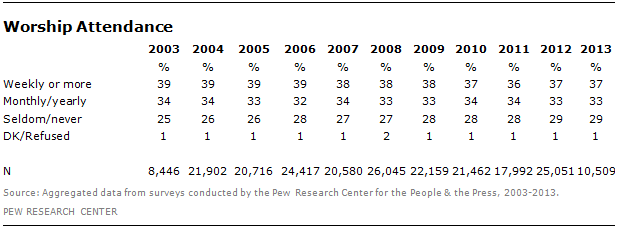This Sunday is “National Back to Church Sunday,” a coordinated effort by more than 20,000 churches of various Christian denominations to reach out to people who rarely attend worship services.
The percentage of Americans who say they “seldom” or “never” attend religious services (aside from weddings and funerals) has risen modestly in the past decade. Roughly three-in-ten U.S. adults (29%) now say they seldom or never attend worship services, up from 25% in 2003, according to aggregated data from Pew Research Center surveys. The share of people who say they attend services at least once a week has remained relatively steady; 37% say they attend at least weekly today, compared with 39% a decade ago.

Of course, how often people say they usually attend services is not necessarily the same as how often they actually do attend. For example, time diary studies, in which respondents report on concrete activities over a limited span of time, often show lower rates of church attendance than data from surveys, which perhaps better reflect how people see themselves (rather than how they behave).
Among the growing share of religiously unaffiliated adults in the U.S., the vast majority say they are not looking for a religion, and relatively few (5%) say they go to services weekly or more often. But what keeps people who have a religious affiliation – that is, who identify with a particular religious group – out of the pews?
A 2012 Pew Research poll asked respondents to answer this question in their own words. Among religiously affiliated Americans who say that religion is at least somewhat important in their lives, but who attend worship services no more than a few times a year, 24% cite personal priorities – including 16% who say they are too busy – as reasons they do not attend more often. Another 24% mention practical difficulties, including work conflicts, health problems or transportation difficulties.
Nearly four-in-ten (37%) point to an issue directly related to religion or church itself. The most common religion-related responses include disagreements with the beliefs of the religion or their church leaders, or beliefs that attending worship services is not important. Meanwhile, almost one-in-ten (9%) do not attribute their lack of attendance at religious services to anything in particular.
